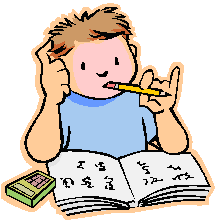there are several techniques to use to learn math. Whether you employ these tips for childhood education or graduate study, they are sure ways to improve your success. Improved concentration, better understanding and practical results are only a few of the benefits.
Learning
- Always take notes. Be sure to write down the process for each example as well as the reasons for each step and the results. Use heading to help you remember what principles you are handling for easy reference.
- Answer questions in class and from your book. The more put mathematics into practice the more you will learn. Be sure to ask why a result was obtained if you don't understand, and take note of the mistakes you made. Continue practicing until you apply a rule correctly each time.
- Take advantage of your learning style. If you are an auditory learner, try tape recording lecturers or classes or pay close attention in class. Use digital media to listen to math lessons at home. For visual learner, note taking is important, and you should pay attention to written examples you can see in front of you. Others prefer to work with their hands and can explore the mathematical principles through examples.
Studying
- Always designate a quite, comfortable space in which to learn. Keep your study area free from distractions and noises and avoid studying in bed, which can make you tired and less likely to concentrate.
- Eat well. Brain activity relies on a healthy diet, so be sure not forget your breakfast or meals before a learning session or test.
- Take breaks. The brain can only concentrate for so long without losing some effectiveness, so you will want to schedule 10-minute breaks. Have to watch on you or clock where you can stop every hour to get up and take a quick walk or have a snack.
- Have a friend or reference assist you if you don't understand something. Emailing a teacher, calling a classmate or checking a reference source can sometimes illuminate a confusing subject by putting it into new terms and perspectives.
Practicing
- Make flash cards. Write a rule or principle on one side and a sample problem on the other. Carry these in your bag or keep them handy for reviewing or memorizing.
- Say problems out loud, and then write them out. Even if you think you are sure of an answer, math should be documented step by step to best solidify the processes in your mind. This also ensures that every type of learner can receive the information in an effective manner.
- Review. Before moving on to new subjects, or when expanding a math subject that relies on other principles and rules, turn back to your previous lessons before moving forward. This will ensure that you have a solid basis for your new tools, and will avoid some of the "simple" mistakes that often appear in the early stages of math problem solving.











Post a Comment